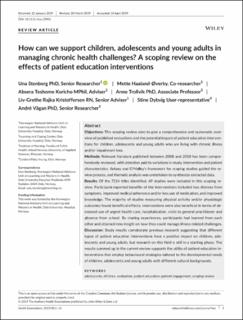| dc.contributor.author | Stenberg, Una | |
| dc.contributor.author | Haaland-Øverby, Mette | |
| dc.contributor.author | Koricho, Absera Teshome | |
| dc.contributor.author | Trollvik, Anne | |
| dc.contributor.author | Rajka, Liv-Grethe Kristoffersen | |
| dc.contributor.author | Dybvig, Stine | |
| dc.contributor.author | Vågan, Andre | |
| dc.date.accessioned | 2020-03-30T06:14:54Z | |
| dc.date.available | 2020-03-30T06:14:54Z | |
| dc.date.created | 2019-06-07T10:52:02Z | |
| dc.date.issued | 2019 | |
| dc.identifier.citation | Health Expectations. 2019, 22 (5), 849-862. | en_US |
| dc.identifier.issn | 1369-6513 | |
| dc.identifier.uri | https://hdl.handle.net/11250/2649255 | |
| dc.description.abstract | Objectives This scoping review aims to give a comprehensive and systematic overview of published evaluations and the potential impact of patient education interventions for children, adolescents and young adults who are living with chronic illness and/or impairment loss. Methods Relevant literature published between 2008 and 2018 has been comprehensively reviewed, with attention paid to variations in study, intervention and patient characteristics. Arksey and O'Malley's framework for scoping studies guided the review process, and thematic analysis was undertaken to synthesize extracted data. Results Of the 7214 titles identified, 69 studies were included in this scoping review. Participant‐reported benefits of the interventions included less distress from symptoms, improved medical adherence and/or less use of medication, and improved knowledge. The majority of studies measuring physical activity and/or physiologic outcomes found beneficial effects. Interventions were also beneficial in terms of decreased use of urgent health care, hospitalization, visits to general practitioner and absence from school. By sharing experiences, participants had learned from each other and attained new insight on how they could manage illness‐related challenges. Discussion Study results corroborate previous research suggesting that different types of patient education interventions have a positive impact on children, adolescents and young adults, but research on this field is still in a starting phase. The results summed up in the current review supports the utility of patient education interventions that employ behavioural strategies tailored to the developmental needs of children, adolescents and young adults with different cultural backgrounds. | |
| dc.language.iso | eng | en_US |
| dc.rights | Navngivelse 4.0 Internasjonal | * |
| dc.rights.uri | http://creativecommons.org/licenses/by/4.0/deed.no | * |
| dc.title | How can we support children, adolescents and young adults in managing chronic health challenges? A scoping review on the effects of patient education interventions | en_US |
| dc.type | Peer reviewed | en_US |
| dc.type | Journal article | en_US |
| dc.description.version | publishedVersion | |
| dc.description.version | submittedVersion | |
| dc.source.pagenumber | 849-862 | en_US |
| dc.source.volume | 22 | en_US |
| dc.source.journal | Health Expectations | en_US |
| dc.source.issue | 5 | en_US |
| dc.identifier.doi | 10.1111/hex.12906 | |
| dc.identifier.cristin | 1703401 | |
| cristin.ispublished | true | |
| cristin.fulltext | original | |
| cristin.fulltext | preprint | |
| cristin.qualitycode | 1 | |

